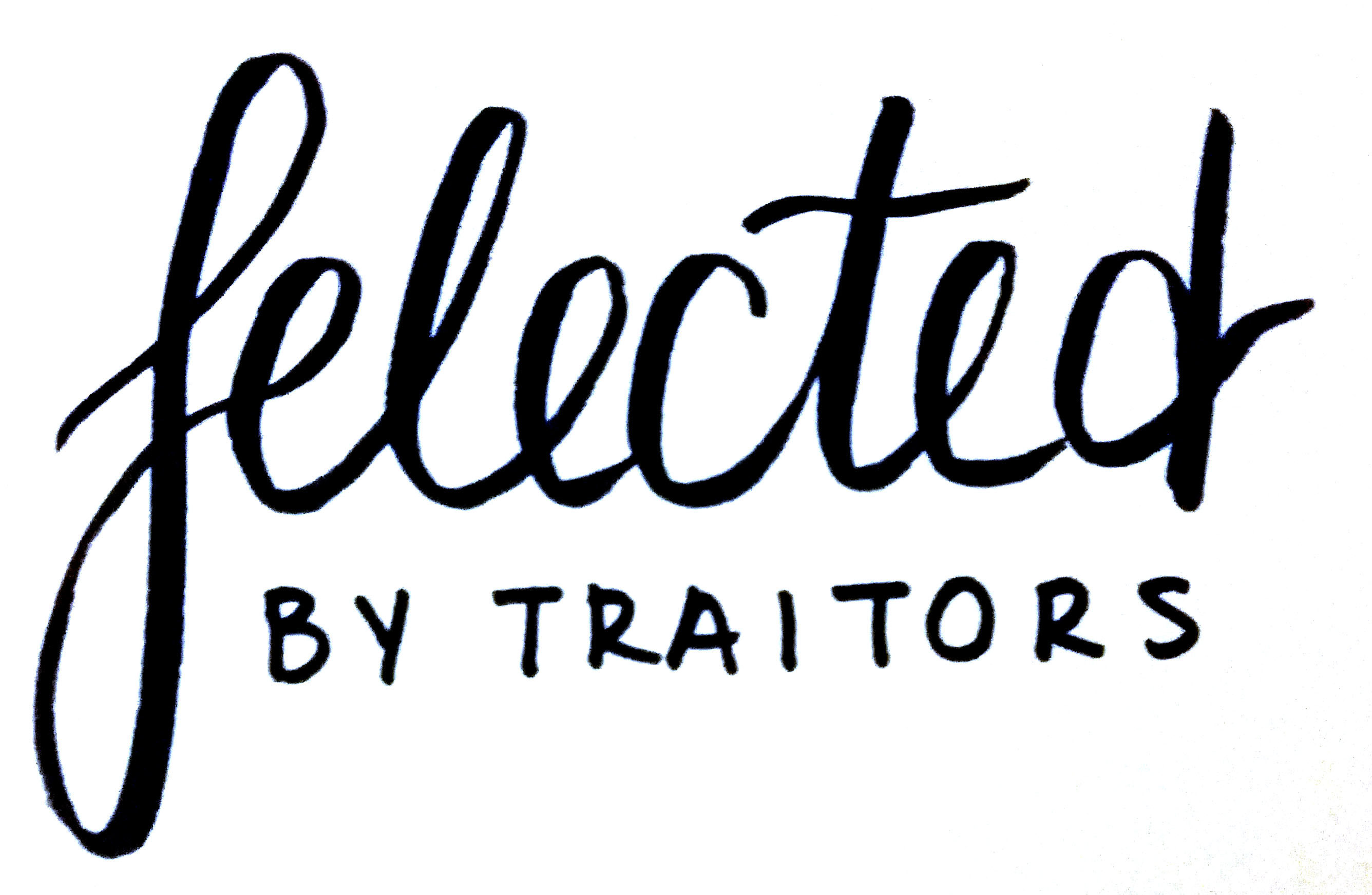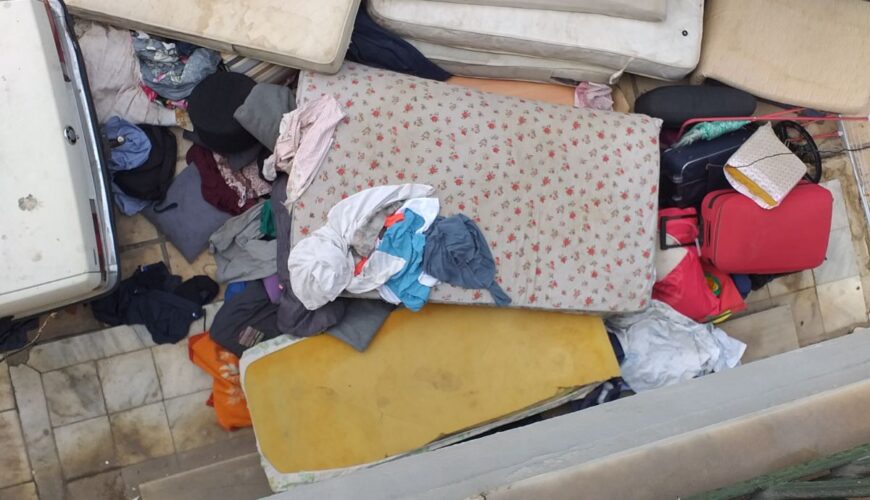When in 2011 the Municipal Council of the City of Thessaloniki decided that the city’s brothels must move to non-residential land of previous “industrial and semi-industrial use”, it also laid the ground for the new Canal D’Amour.
Bel Ami
Bel Ami, a luxury brothel, with jacuzzis embedded, situated in the west outskirt of the city, the so-called Beh-tsinari area, was pretty close to the new designated area. But not close enough. With the ensuing closure of the enterprise, the monthly rent waiting to be paid and the economic crisis leaving no room to cover superfluous costs, the investor decided to quit.
Mortgaged at the bank and without the monthly income flowing from the investor, the property started accumulating debts. But it didn’t remain empty. Nikos Sapatoris, one of the brothers who owned the property, returned there. He not only filled the space with his physical presence, but also with the objects that he obsessively collected. As his nephew Xristos says, “Nikos had some psychic problems and had the tendency to collect whatever object he found.”
Sometime later, while generating worry, his sudden disappearance did not come as a shock. Despite public calls and alerts asking for any information in regards to the disappeared, investigations led nowhere. The police couldn’t find any evidence of Nikos in their visits to the house either.
This is precisely why the phone call Mr. Ilias received – the brother of the disappeared and co-owner of the property – was peculiar. Neighbours complained of a foul odour coming from the property. During the house search, this time round, Mr. Nikos’s lifeless body in an advanced stage of decomposition was found on a chair alongside unknown persons using the place as a refuge. Bodies, dead and alive, were floating in a sea of objects the deceased had collected.
The house, with an investor long gone and with the owner now dead, was sending out a call to shelterless people who were looking for a place to stay. The official police operation for evacuating the place after Nikos Sapatoris’ death didn’t bring to an end this informal use of the property. The house was pinpointed as a vacant safescape on the collective oral map of this roving crew of neglected people. The coordinates were sent to any user of this informal network who was in search of shelter. Mr. Ilias would visit the house regularly and evacuate the place – with or without police support – fixing the breaches and inlets on the sides and entrance of the house. But on each return he would find a new fissure. His visits were infrequent with no avail and the evacuations were irregular at no cost for the evicted. Regardless of how many times the building was sealed and barred, the crew always found a way to re-enter.
The manhunt
Babis Gerolakos is waiting in the corner where Giannitswn meets Stavrou Voutira Street, car engine on, fumes spewed from the exhaust pipe, radio tuned in some quaint local station playing Greek folk. On his white T-shirt one reads in black letters: “We say yes to the development of our beloved Second District [1]”. First, we visit his own property, a vast flatland covering fertile soil with three concrete half built skeletons growing like sprouts of the familiar flora that dominates Thessaloniki’s urban ecosystem: the condominium.
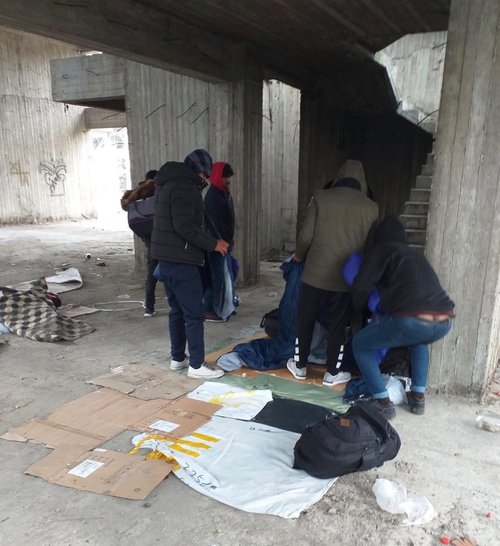
He narrates how this vacant land with semi-abandoned properties — which he partly owns together with 87 other members of a co-operative set up by their migrant relatives returning to Greece from the former Soviet Union — had turned into an informal settlement for hundreds of undocumented migrants: the “μουσαφίρηδες” as Babis calls them had created a shanty town. When he found out about this informal, temporary settlement, he charged himself with the duty of evacuating from the property the migrants’ “unwanted” presence: “In 2018, I went to take them out and they asked to see identification papers proving that I am the owner of the property. When I tried to vacate the place by force they stabbed me”.
He initiated his campaign and vigilant activism in 2018 but succeeded in his goals only in late 2019. He managed to permanently evacuate the property by deploying a well-executed plan. Initially he hung a pig’s head from the ceiling of the main structure: «They are Muslims and I thought this might discourage them. But it was futile”. Then he started paying regular, unexpected visits during early morning hours in the middle of the winter, cutting migrants’ tents open wide in the cold, beating them up, and evicting them. They kept coming back. He impeded the volunteer workings of solidarity vans parked nearby, providing services and assistance to the migrants: “Recently, one of them was set on fire. I do not know who did it”.
In a moment of genius he reached an informal agreement with a truck driver of the major excavating company digging the holes of the metro line of the city and asked him to bend the protocol and unload the excavated soil onto his property for a mutually beneficial price. He took this chance to use the excavating machinery to demolish some dilapidated structures, leaving one untouched to be used as a shelter for two Pakistanis — who agreed, in exchange for his “generosity”, to keep him informed of any new “μουσαφιρηδες[2]” entering the property and to decode for him the messages written on the walls. “The last time I sealed the property I left two Pakistanis to stay in one of the spaces, with the precondition that they will inform me of any suspicious activity in and around the property. I have my own snitches.” They hold an online group and they inform him of any new visitors. They were the ones who translated what was written on the building’s walls. “They tell me what the messages mean. They are left by former squatters for the newcomers to signal that the space is up for their use. I have installed my snitches. I will let none of these illegal migrants appropriate what is mine. This belongs to me and my children.”
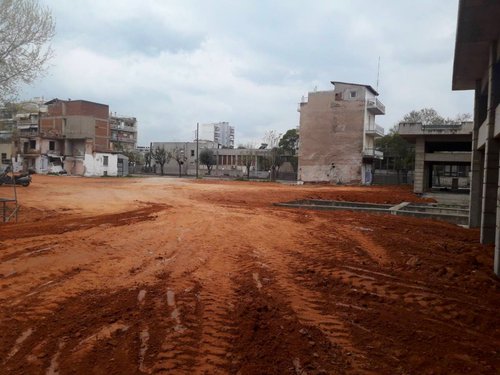
Babis then expanded his activism beyond his own property to the wider Second District. He has taken on himself the role of warden of the Second District. It’s on him that the property owners rely, to him that they direct their complaints and him they call upon when needed. After his morning job as a hauler he undertakes what he considers his duty: his daily agenda includes patrolling the neighbourhoods, entering the shops of migrants which he considers “magnets for more”, vacant warehouses on Matzarou street and various abandoned train wagons behind the station; he basically patrols each spot with a potential to be used as informal shelter, monitors vacant buildings, and voluntarily drafts ‘Reports’ for the police and Sanitation Agencies. Regularly he evicts migrants himself: “I only call the Police to have my back covered. I can demonstrate having called them. But they don’t do much. This has changed since 2019 when New Democracy (the new right-wing party in government) got into government but still you have to do things yourself.”
Actually, Babis is now more than ever, able to perform his vigilantism without repercussions. He installed a facebook group entitled “we say yes to the development of the Second district”, asking locals to indicate and report any illegally squatted properties and any migrant “misconduct” in the territory. His activism was rewarded with formal election to the local board of the district and his inauguration as person-in-charge of the Local Committee for Migration.
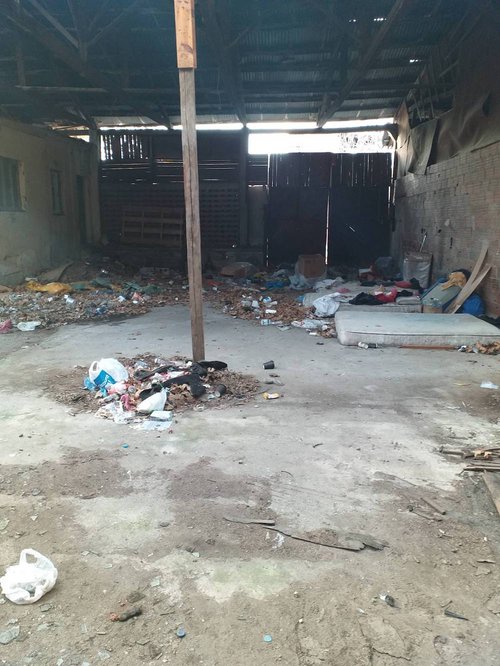
Since his election he has neither stopped nor formalised his activities. During our interview, he unravels the list of his recent achievements. We drive in Georgiou Tsontou Street, a cobblestone of a peculiar form, surrounded by newly-built, luxurious high rises among old, single family, dilapidated buildings. He indicates one high rise: “The residents wrote to me on facebook and asked me to do something about the μουσαφιρηδες living in the vacant wagons of the rail tracks. They were afraid for the safety of their kids playing in the alley.” He told me how he activated the same process:
“I called OSE [3] and asked them to install a fence to cut the passage from the alley to the wagons. I told them that it was a matter of safety for the kids. They agreed to include it in the budget of another project already under way and they eventually installed a fence even larger than the one I had asked for.”
We drive towards Mantzarou Street. Before we arrive there I hear him laughing. He indicates a vacant plot of land in Katerinis Street. “I did not know that they demolished this one”. There used to be a single family unit there squatted by undocumented migrants and Babis had unleashed a campaign of consecutive reports towards the Sanitation Agency; it seems that the structure has now been demolished. We reach Matzarou Street and Babis switches the engine off but surprisingly leaves the car windows down — something incompatible with his descriptions of the neighbourhood as a criminal zone. We enter a building through a narrow opening in the wall while he narrates his previous manhunts without pause. He suddenly stops talking and turns to me whispering:
“Here is one. Look!” and he indicates a guy resting on a mattress laid on the floor, a lighted candle on the side and derelict furniture all around.
“Where are you from ρε;” asks Babis
“ I am from Pakistan”
“And do you like sleeping here?”
“ Νο, Ι don’t like it here”.
Babis turns to me:“Same thing, everywhere they go they bring dirt in.
«Do you have 1 – 2 euros?”asks the person on the mattress.
“Do you want 1 – 2 uppercuts?” responds Babis.
Informal unhousing
When Ilias Sapatoris, the owner of Bel Ami and brother of Nikos Sapatoris decided to take more drastic measures in the fall of 2019 — after failed attempts to empty his property of unwanted visitors — he was referred to Babis Gerolakos. Following the preparatory discussions, Ilias gave Babis a free hand to take whatever measures were necessary to evacuate the former brothel in Beh-Tsinari indefinitely.
Yet, at the end of 2019, Ilias himself passed away, leaving the burden of property and debt management to his son, Xristos. When Xristos visited the property to assess the state of play, he came across an ugly sight: the handles were broken, the furniture and the bathroom were in a desolate state beyond use, with the neighbouring house, also used as an informal shelter, destroyed by a fire arising from the illegal use of electricity. When a little later, the electricity company sent him a penalty bill for illegal use of electricity, he decided to continue with his father’s decision.
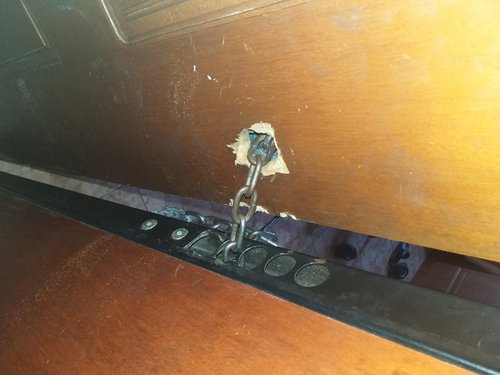
He informed Babis, an expert and veteran of the procedures that needed to be followed. They cut the connection to the power grid and filed a complaint with the police. They then entered the property and found five persons inside with the traces of five others who were sleeping in the four rooms and on the mattresses of love or simply on the naked floor. When Xristos told them that he was the owner of the property and that the squatters would need to go, they accepted the unpalatable news but not without discomfort. One of them answered Xristos that he wanted his fifteen euros back.
“ The guy told me‘I gave 15 euros to stay here’.
‘Who did you give it to? The house is mine’ I retorted.
There must be someone, we suspect a Greek, who strolls the neighbourhoods, finds vacant properties and places homeless people in houses in exchange for money”.
No man’s land
Similar scenes unravel in the wider area of Western Thessaloniki. The former brothel, Bel Ami in Behtsinar, belongs to the housing stock of a city that is in limbo, gripped by the red tape of the state or banks. The heir doesn’t want it as the property carries with it a whole lot of debt. The bank doesn’t want it as proper ownership of the property would mean dealing with the inextricable tangle of lost or reluctant landlords.
As Xristos puts it: “even those vulture funds which purchased the non performing loans and potentially the properties have got themselves in trouble; they just don’t know it yet. In this case only red tape keeps the upper hand, sending around notes. The property itself is dead space.”
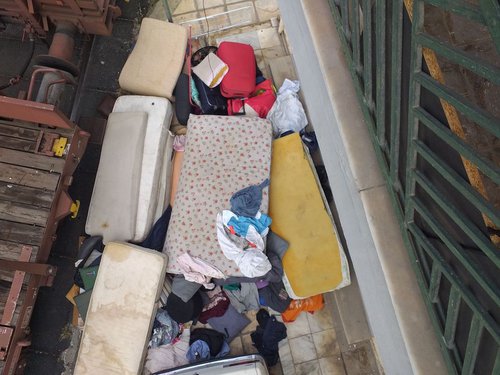
Countless properties in the city, not used by anyone, have fallen into a state of destitution. And in this obfuscated state of things, the corporate powers of the informal para-economy take the stage, operating under greater risk but certainly a lot more flexibly. Potential tenants are in search for any kind of shelter, looking for vacant spots close to the urban centre with a greater chance to tap into formal or informal labour opportunities. The spaces they find are of a temporary nature; a short stay in empty properties soon to be abandoned. In a bizarre case of brokerage, the mechanism informally mobilises a housing stock which has fallen into disuse (supply) to match the need for shelter of undocumented migrants (demand) and rents it out as if it were its own, albeit for 15 euros.
But the property remains dilapidated. Like the former brothel, Bel Ami, the deregulated fashion in which these properties are treated brings further damage. When Xristos Sapatoris visited the property, he saw that most objects of value had disappeared or were worn beyond use; furniture broken, handles replaced with chains, broken toilets replaced by bottles full of urine.
“when we got them evicted, I called in a guy to help with cleaning up. He was a good, hardworking guy but completely stupid. He found a rat, caught it by the tail and threw it in the plastic trash bag with the bottles filled with urine: ‘you mousey will go on a trip’ he said.. and threw it in… The rat opened a hole in the bag and escaped. I lifted the bag after a while, and because the bottle caps were not well placed I became a mess”.
This property is the source of bad omens for Xristos. A burden with a tail of debt which is in turn linked to a series of unpleasant events. But his attitude towards these unorthodox tenants remains a mix of understanding and irritation. “They were staying in camps, then found a house and settled in. The guy I found in the basement… he was also an undocumented migrant but he took care of the place, he kept it clean, it was obvious”.
Welfare or urban warfare
“It is absolutely necessary to have in place an official mechanism which provides incentives and benefits for all, both for the landlords and those who need affordable housing”, says Dimitra Siatitsa, who is participating in a city wide research initiative on affordable housing in Thessaloniki. “There are examples from Spain, Belgium and elsewhere which we could take stock of. The housing stock in the country is massive and in tandem there are countless people in search of shelter. The response has to be systematized”.
The models suggested by Dimitra are multiple and are already being implemented in various European cities: social rental services that provide rent subsidies and facilitate agreements between potential tenants and landlords, paying all or part of the rent for those who satisfy the criteria; or favourable lease agreements with landlords in exchange for refurbishment of the property and the covering of utility costs.
For the moment though, the neglected and unused properties in Western Thessaloniki are transformed into territories serving as refuge for uncharted people. Among them, some which make a living in ways bordering the illegal. Outlaws, they interchange roles between victim and perpetrator, thieves or prey, in a manhunt without sanctions. Off the grid of formal institutions, countervailing forces unravel themselves, which labels the refugee population as a criminal demography and fuels extreme political forces which feed on all this turmoil. To pay for informal accommodation people in need pay fake landlords; neighbourhoods then turn for help to informal manhunters who generate the necessary guardianship.
Babis is a leading character in a network of vigilantism arising in the Second district of Thessaloniki. He is not the only one. The installation of fences and enclosures, the disruption and dismantling of an already volatile and weakened safe-scape for the undocumented migrants’ route, the demolition of buildings and vigilant evictions of migrants from informal housing structures, are all part of their action plan and contribution in the spatial reconfiguration of the city and in what might be called informal un-housing.
The concentration of migrants and refugees in western Thessaloniki has activated informal apparatuses charged with patrolling the neighborhood and “secure” in their territory. Razor-wires fence formerly accessible passages, buildings get demolished, people get evicted by vigilant manhunters; a vigilantism that overlaps with institutional rearrangements for the enhancement of police effectiveness.
The Municipality
The grey building of Monastiriou Street 93B, accommodates three institutions with completely opposing agendas: the offices of the REACT project of the Municipality funded by the EU through the UNHCR, that has developed an accommodation program for asylum seekers; the offices of the local council of the Second District, where Babis Gerolakos performs his institutional role and responsibilities as the elected representative of the local citizens enforcing a rather securitarian agenda. Since the election of the local council in 2019, there are increased reports of complaints, signed by numerous citizens driven by Babis, against what they see as rising criminality in their neighbourhood.
These complaints have made a significant contribution to the generation of the prototype police force that was installed and placed in the same grey building. At the monthly meeting of April,22 2020 which was held digitally due to COVID-19, the Municipal Council of Thessaloniki approved a memorandum of cooperation between the State Police and the Municipal Police Force. The Coordination Centre started operating at the beginning of May from the third floor of the building at Monastiriou 93, coordinating the joint actions of the Greek Police and the Municipal Police of Thessaloniki. During his inaugural speech the Minister of Citizen Protection, Michalis Chrysochoidis told the press: “The coordination centre is charged with bilateral exchange of information between the State and the local Police on issues of common interest. The Centre will carry out joint or additional patrols or other organised actions to combat petty crime, drugs, etc.»
The symbolism of placing a joint police prototype force in the same building where REACT holds its offices, signifies a gradual institutional rearrangement and a political turn that invests in a securitarian discourse conflating migration and criminality, rather than aspiring to deploy a welfare response to the suburbanisation of poverty and racial exclusion that is playing itself out in the western suburbs of Thessaloniki. This extensive formal and informal policing, this synchronisation of a persistent securitarian discourse with an overgrown investment in police and the emergence of informal vigilantism, is one of the outcomes of the persistent dismantling of the welfare state and the resolute refusal of government to expand provision for those left behind.
The State, stripped in its core police functions mobilises a technology of “othering” and deploys mechanisms and apparatuses of control and discipline these “Others” to secure an authoritarian neoliberalism: a governmental project that uses its reduced social, political and economic means to produce targeted and systematic divisions, insecurity and abandonment. This depends, inter alia, on a renewed national and ethnicized demographic and on anti-immigrant sentiments.
Indifferent to providing solutions to the housing crisis and issues such as healthcare services and employment for everyone regardless of their background, the welfare version of the state gives way before a police force charged with suppressing the actions of people who have been placed in the geographical and social margins.
And if there is a conclusive moral to this whole story, it is surely one quite banal and commonplace: what we need is not more policing, but long term policies and strategies that can guarantee the provision of affordable housing, care and dignified living conditions for all.
First published in OpenDemocracy
